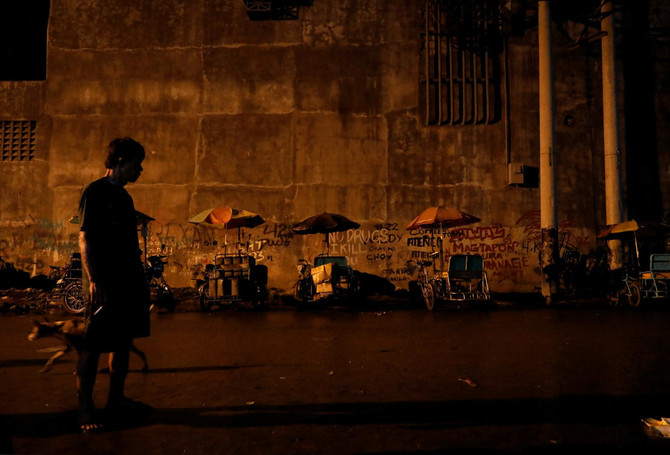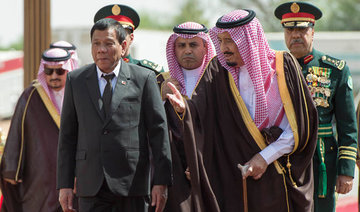MANILA: As night falls in Manila, the Philippine capital, few of the 700 families living in the sprawling portside shanty town known as Market 3 dare to venture out of their homes.
The crime-ridden maze of sheet metal, crumbling cement and wooden boards has become a frontline of the bloody war on illegal drugs that has defined Rodrigo Duterte’s presidency since it was unleashed in June 2016.
Dozens of Filipinos who lived along the slum’s narrow dirt-floor alleys have wound up dead. The community lives in fear of masked or mystery men dragging away slum dwellers, or police and their notorious “Tokhang” operations, where officers are required to knock on doors of suspected dealers to urge them to surrender. But those visits have been fatal.
“Many people have left. They leave because of Tokhang,” said Nenita Bravo, a 56-year-old Market 3 resident.
“We can’t really count them anymore,” she said, referring to those killed, adding that she had witnessed many killings in the area. “We can’t really count them because there’s been so many.”
Bullet-ridden corpses are found hours or even days later, often just a few minutes away, although police say there have been no illegal killings in their anti-drug campaign.
Yet the frequent police operations and shadowy murders have hit the slum hard and those who live there say more blood has been spilled since he was elected president on the promise to wipe out drugs and crime in six months.
“Since Duterte came, that’s when there was a rise in killings. It was pitiful, especially so for the many women killed,” said Visitacion Castellano, 73, a long-time resident of Market 3.
“They should have given them years. Put them in jail. But not kill.”
In Spanish colonial times, Navotas, as the area was known before the patchwork of shanty communities emerged, was the home of a middle class that lived off the sea, either as owners of fishing boats or shipbuilders.
Now employment is in short supply, with men jumping from one informal job to the next, such as scavenging or unloading fish from returning trawlers.
Although life is hard, people get by, but there is never enough.
Scarcity fuels desperation and the desperate turn to petty crime, or dealing and using drugs, mostly “shabu,” the methamphetamine Duterte says could destroy a generation of Filipinos.
One 28-year-old man who spoke to Reuters was among those who sold and used shabu. During one of the deadliest chapters of the drugs war in August 2016, he said his partner and mother of his five children was murdered, her body found riddled with bullet wounds in the head and chest.
The former drug user, who refused to give his name for fear of reprisals, then fled Market 3 and says many of his friends did the same, or are now dead. He even tried, unsuccessfully, to take his own life, he said, by hanging himself with his belt.
The man is in poor health, skinny and coughing frequently due to tuberculosis. Nuns now take care of his youngest children.
Too weak to work, he spends his days at the port waiting to beg for scraps of fish from returning boats.
His dream, he says, is to regain strength so he can work, and build a home for himself and his children in the Market 3 shanty town where they can live, free of drugs and the fear of police raids.
“My only concern now is for my four kids to have a different life,” he said.
One woman in the community told Reuters that four of her seven children are in prison, three on drugs charges and one accused of murder.
Her youngest son was killed in June 2016 in what police said was a sting operation in which he was armed, and refused to go quietly, a typical description of the almost 4,000 cases in which police say a suspected drug dealer was killed.
Police in Navotas could not be reached for comment on the killings during their anti-drugs operations.
The woman, who asked for anonymity, is certain that police killed her son in cold blood while he was asleep, adding that she even heard them joke about it.
Nightfall in Philippine slum revives spectre of deaths in drugs war
Nightfall in Philippine slum revives spectre of deaths in drugs war

Nigeria tanker truck blast toll rises to 86: rescuers

LAGOS: The death toll from the explosion of a petrol tanker truck in Nigeria that killed people rushing to gather fuel has risen to 86, emergency services said Sunday.
"The final death toll from the tanker explosion is 86," said Ibrahim Audu Husseini, spokesman for the National Emergency Management Agency in Niger state.
The truck carrying 60,000 litres of gasoline exploded after flipping over on a road in the centre of the country on Saturday, authorities said.
Pope Francis calls for Gaza ceasefire to be ‘immediately respected’

- Pope Francis: I also hope that humanitarian aid will even more quickly reach... the people of Gaza, who have so many urgent needs
VATICAN CITY: Pope Francis called Sunday for a ceasefire in Gaza to be “immediately respected,” as he thanked mediators and urged a boost in humanitarian aid as well as the return of hostages.
“I express gratitude to all the mediators,” the Argentine pontiff said shortly after the start of a truce between Israel and Hamas began.
“Thanks to all the parties involved in this important outcome. I hope that, as agreed, it will be immediately respected by the parties and that all the hostages will finally be able to go home to hug their loved ones again,” he said.
“I pray so much for them, and their families. I also hope that humanitarian aid will even more quickly reach... the people of Gaza, who have so many urgent needs,” Francis said.
“Both Israelis and Palestinians need clear signs of hope. I hope that the political authorities of both, with the help of the international community, can reach the right two-state solution.
“May everyone say yes to dialogue, yes to reconciliation, yes to peace,” he added.
A total of 33 hostages taken by militants during Hamas’s Oct. 7, 2023 attack on Israel are scheduled to be returned from Gaza during an initial 42-day truce.
Under the deal, hundreds of Palestinian prisoners are to be released from Israeli jails.
The truce is intended to pave the way for an end to more than 15 months of war sparked by Hamas’s attack, the deadliest in Israeli history.
It follows a deal struck by mediators Qatar, the United States and Egypt after months of negotiations, and takes effect on the eve of Donald Trump’s inauguration as US president.
Bangladesh seeks arrest of MP cricketer over bounced cheques

- Bangladesh court issues warrant for Shakib Al Hasan for bounced cheques totaling $300,000
- Hasan is a former lawmaker from the party of autocratic, ousted ex-leader Sheikh Hasina
Dhaka: A Bangladeshi court issued an arrest warrant on Sunday for cricket star Shakib Al Hasan for bounced cheques totalling more than $300,000, in the latest blow for the ousted lawmaker.
“The court has previously summoned Shakib but he did not appear at the court,” said Mohammed Shahibur Rahman from the IFIC Bank, which filed the case.
“Now, the court has issued the warrant,” he said.
Shakib is a former lawmaker from the party of autocratic ex-leader Sheikh Hasina, who was overthrown by revolution and fled by helicopter to India in August 2024.
His links to Hasina made him a target of public anger and he was among dozens facing murder investigations for a deadly police crackdown on protesters during the uprising.
He has not been charged over those allegations.
Shakib was playing in a domestic Twenty20 cricket competition in Canada when Hasina’s government collapsed and has not returned to Bangladesh since.
The left-arm allrounder has played 71 Tests, 247 one-day internationals and 129 Twenty20s for Bangladesh, taking a combined 712 wickets.
However, he was left out of the 15-man squad for the one-day international tournament in the Champions Trophy in Pakistan and Dubai next month.
Najmul Hossain Shanto will captain the side, with Bangladesh placed in Group A alongside India, Pakistan and New Zealand.
UK family visa applicants from war-torn countries caught in bureaucratic limbo

- Home Office granting just a handful of waivers to people in countries where biometric information cannot be collected
- Those seeking refuge from Gaza, Sudan and Afghanistan among those awaiting authorization
LONDON: Refugees trying to escape Gaza, Sudan and Afghanistan and join family members in the UK are in limbo between government bureaucracy and a lack of biometric processing facilities.
As part of the family reunification visa application process, applicants must submit biometric information, usually including a fingerprint, at centers in the countries from which they apply.
But such centers often either do not exist in war-torn areas or the facilities are not available to gather the information. This means applicants must either complete the biometric processing once in the UK or be excused from the biometric process entirely.
Figures published by The Guardian on Saturday, however, show that just a handful of these deferrals or exemptions have been granted by the UK.
As of May 2024, 114 people had requested to have their applications “pre-determined” by delaying the submission of biometric data until reaching the UK. Another 84 people had requested to be excused from providing biometric information altogether. By February 2024, just eight predetermination cases and one excusal had been authorized.
The highest number of the requests came from Palestinians and those in Afghanistan and Sudan, where visa application centers have been forced to close due to conflict.
Members of parliament and charities have accused the Home Office of blocking people such in areas from joining their families in the UK.
They compared it to the situation in Ukraine, where people can apply for family reunification visas in the UK without submitting biometrics beforehand.
“The UK rightly welcomed Ukrainian refugees fleeing war. Why can’t the same compassion be shown to people from Gaza and elsewhere?” a coalition of independent MPs, including former Labour Party leader Jeremy Corbyn, told The Guardian.
Nick Beales, head of campaigns at the charity RAMFEL, which helps vulnerable migrants access justice, said: “This disclosure proves that it was actually impossible for people in conflict zones, such as Sudan and Gaza, to apply for visas even when they had clear family ties in the UK.”
A Home Office spokesperson told The Guardian they understood applicants may face challenging circumstances to reach a visa application center to submit biometrics, saying: “That is why individuals have the option to submit a biometric deferral request, which is assessed on its own merits, and exceptional circumstances are considered.”
Taliban deputy tells leader there is no excuse for education bans on Afghan women and girls

- The Taliban government has barred Afghan females from education after sixth grade
- There are reports authorities had also stopped medical training and courses for women
A senior Taliban figure has urged the group’s leader to scrap education bans on Afghan women and girls, saying there is no excuse for them, in a rare public rebuke of government policy.
Sher Abbas Stanikzai, political deputy at the Foreign Ministry, made the remarks in a speech on Saturday in southeastern Khost province.
He told an audience at a religious school ceremony there was no reason to deny education to women and girls, “just as there was no justification for it in the past and there shouldn’t be one at all.”
The government has barred females from education after sixth grade. Last September, there were reports authorities had also stopped medical training and courses for women.
In Afghanistan, women and girls can only be treated by female doctors and health professionals. Authorities have yet to confirm the medical training ban.
“We call on the leadership again to open the doors of education,” said Stanikzai in a video shared by his official account on the social platform X. “We are committing an injustice against 20 million people out of a population of 40 million, depriving them of all their rights. This is not in Islamic law, but our personal choice or nature.”
Stanikzai was once the head of the Taliban team in talks that led to the complete withdrawal of foreign troops from Afghanistan.
It is not the first time he has said that women and girls deserve to have an education. He made similar remarks in September 2022, a year after schools closed for girls and months and before the introduction of a university ban.
But the latest comments marked his first call for a change in policy and a direct appeal to Taliban leader Hibatullah Akhundzada.
Ibraheem Bahiss, an analyst with Crisis Group’s South Asia program, said Stanikzai had periodically made statements calling girls’ education a right of all Afghan women.
“However, this latest statement seems to go further in the sense that he is publicly calling for a change in policy and questioned the legitimacy of the current approach,” Bahiss said.
In the Pakistani capital, Islamabad, earlier this month, Nobel Peace Prize laureate Malala Yousafzai urged Muslim leaders to challenge the Taliban on women and girls’ education.
She was speaking at a conference hosted by the Organization of Islamic Cooperation and the Muslim World League.
The UN has said that recognition is almost impossible while bans on female education and employment remain in place and women can’t go out in public without a male guardian.
No country recognizes the Taliban as the legitimate rulers of Afghanistan, but countries like Russia have been building ties with them.

















